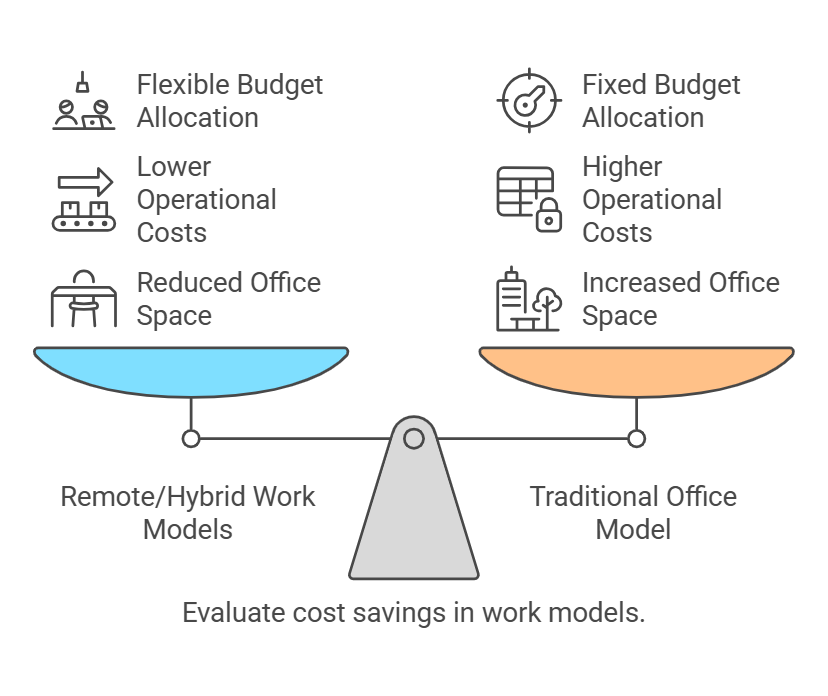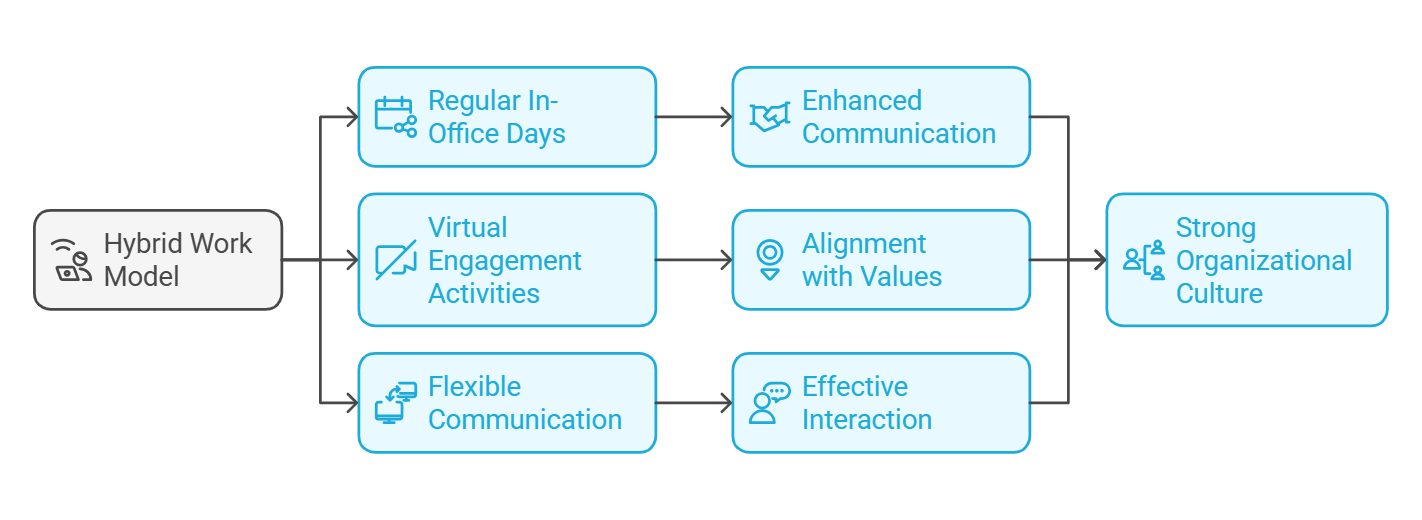
The trends of where people work and how they work have shifted exponentially over the years with more and more appreciation for the concept of working from home and the blended work model. Telecommuting and other flexible working arrangements have transitioned from tender to preferred organizational models. In this article, we shall list the numerous advantages of working from home and Hybrid Models for Employers for instance cost reduction, enhanced productivity, and positive employee attitude.
1. The Rise of Remote and Hybrid Work
The disruption caused by the pandemic highlights that remote work is viable and the hybrid work model is efficient. It has become apparent these changes have yielded positive outcomes for employees besides the employers most especially in a bid to optimize organizational efficiency as firms respond to the increased calls for flexibility at the workplace. The situation in which employees spend several days at the office and several days at home is optimal for most workers and give businesses numerous opportunities to reduce costs and manage personnel effectively.
2. Cost Savings with Remote and Hybrid Work Models

The other benefit that working from home has for employers is the degree of expense savings when it comes to overhead expenses. Businesses that switch to a hybrid work model or remote working model can save costs on office space as a result of rent, utility bills, and building maintenance.
- Reduced Office Space: Occupancy rates are lower in an office environment and therefore, less space is needed, which decreases the costs of renting and utility bills.
- Lower Operational Costs: Often employees are less in an offsite than in a centrally located office; therefore, expenses on supplies, cleaning services, etc.
- Flexible Budget Allocation: Since office cost is eliminated, it is possible to use the money saved towards programs that support employee wellness, training, or equipment.
3. More Productivity and Concentration
Pre-existing research has also revealed that arising from the flexitime arrangement, workers particularly those employed to work from home enjoy boosted productivity. The advantages of working from home for employees is that they can easily concentrate on work with little further interruptions. The hybrid work model is yet again beneficial for the same reason, people can select the environment they prefer for optimal productivity.
- Fewer Office Distractions: Remote work greatly minimizes interference from the kind of noise or disturbances that are characteristic of an office environment.
- Flexibility for Optimal Productivity: In a phenomenal world, one can work from the office and from home based on the environment which creates a focused environment.
- Higher Morale and Engagement: In particular, work flexibility always makes employees more engaged, and in turn, increases the productivity of a company.
4. Improved Employee Satisfaction and Retention
Income satisfaction and retention are some of the most valued benefits of ‘shifting’ employees to work from home. For most workers, the ability to work from home or the desire to go to the office sometimes frequently is one of the things that professionals who are in organizations value most.
- Better Work-Life Balance: Flexibility and homework allow workers to combine work and home responsibilities and cut down work-related stress.
- Higher Retention Rates: Organizations that allow flexwork have increased chances of keeping talent as workers rarely quit companies that respect their health.
- Increased Employee Loyalty: It is because flexibility at the workplace shows that the employer has a belief in their employee, and therefore is a motivational factor towards productivity.
5. Access to a Broader Talent Pool
Another benefit of the hybrid work model is that many people fail to notice that organizations can staff employees irrespective of location. Switching to the hybrid or fully remote work approach helps to free the company from geographical constraints and opens the option to hire the best candidates for a particular position.
- Hiring Beyond Borders: This means that remote work helps companies tap talent outside their location, so business can increase their diversity and knowledge base.
- Competitive Advantage in Recruitment: Providing flex work and/or options for telecommuting are perhaps the most important organizational tactics that enable businesses to provide the best prospects while catering to the needs of a candidate who values flexibility in his / her work schedule.
- Lower Relocation Costs: Opening the doors to remote or hybrid models means there’s no requirement to cover relocation fees anymore, and, therefore, a more effective process of recruiting has commenced.
6. Flexibility at Workplace
Workplace Flexibility has become a more critical factor in the organization today than ever before for the employer and the employee. It enables employees to work when they are most productive and fosters a favorable working climate. The hybrid work model combines the flexibility of remote working and the rigid organization of physical office work meeting the needs of a modern employee.
- Adapting to Employee Preferences: With flexibility, employees can rewrite and design their work schedules according to their lives thus improving satisfaction.
- Reduced Absenteeism: Remote work options help employees deal with their personal matters and therefore do not have to be relieved from work.
- Customized Workspaces: Employees have personal control of their working environment and are able to create an environment that goes a long way to make them comfortable besides enhancing productivity.
7. Positive Environmental Impact
One of the more significant benefits of working from home is, therefore, the environmental footprint. Thanks to fewer employees traveling to work daily, organizations can support sustainability objectives to reduce carbon impact.
- Reduced Emissions: Less vehicle use results in low emissions of greenhouse gasses within society.
- Lower Energy Consumption: Less working space means that energy consumption will be low, thus promoting the conservation of the environment.
- Corporate Social Responsibility: As a result of the evidence of support for greater flexibility, the organizations that support such practices can benefit by promoting the environmentally friendly aspects of their organizations to increase their popularity among socially /environmentally aware consumers.
8. Strengthening Company Culture in a Hybrid Work Model

This is the downside of telecommuting: keeping every company spirit is a bit difficult. That is, while remote work can weaken a strong organizational culture, a hybrid work model can support sustaining a strong organizational culture.
- Regular In-Office Days: They used to see their team members in person occasionally, and thus, they have arranged specific days when team members must be in the office to enhance communication and working relations.
- Virtual Engagement Activities: Hosting conferences and meetings online it will provide an avenue of means through which remote employees are also able to take note of the values and objectives of the organization.
- Flexible Communication: The use of both virtual and employee face-to-face contact becomes excellent when it is employed to allow employees to interact effectively and promote the company’s culture.
9. Implementing the Hybrid Work Model
For managers to reap the benefits of working remotely and the hybrid work model, they are required to set some grounds and get the appropriate assets. A successful hybrid work model means that employees can get the most out of themselves without deviating from organizational goals.
- Clear Guidelines: Gather guidelines that describe working offline or on-site to carve clarity.
- Investment in Technology: Get your staff the resources they require to work cohesively no matter the place they are in.
- Regular Feedback Loops: Regularly administer questionnaires to get a sense of whether or not employees are content with the hybrid model and then act accordingly.
| Latest Category Jobs | ||
|---|---|---|
| Job Information | Apply Job | |
Staff System Development Engineer(3-5 years) | ||
Application Developer(12-13 years) | ||
Sr. Portuguese Language Expert - Opportunity - Oracle India Pvt Ltd(2-7 years) | ||
Technology Enablement Dev-Java Manager(7-8 years) | ||
Motherson Group is Hiring for Multiple Positions(0-8 years) | ||
Workday Studio Integrations(12-15 years) | ||
Conclusion
Thus, the recognition of the opportunities of teleworking and the limitality of the hybrid work model can really help employers. With these benefits such as cost cutting, higher output, access to diverse human resource talent, and high job satisfaction, flexibility of work arrangements has become the key strength as firms try to cope with the shifting market dynamics of the corporate world. Increasingly, organizations are appreciating the need to incorporate workplace flexibility strategies and as a result, those that do will harness key employees and in the process develop a more robust and adaptable workforce. To organizations that require cutting-edge approaches to staffing, Rozgar.com offers a full-spectrum range to facilitate the recruitment and hiring processes.
Frequently Asked Questions
The benefits of home working for employers are cheaper overheads, higher output, easier recruitment, and staff contentment.
A hybrid work model offers flexibility, cuts expenses, and favorable conditions for work balance that leads to increased employee retention and satisfaction.
Other factors that make employers more attractive include; Flexibility, there is an increased demand by candidates for workplace flexibility that enables them to manage their personal and work-related business.
Key points that have been highlighted include ways of achieving corporate culture in work from a home model including communication, collaboration days, and virtual engagement.
By working from home the carbon emissions from commuting are cut, office energy usage is less and the company supports sustainability goals, therefore having a smaller environmental impact.



